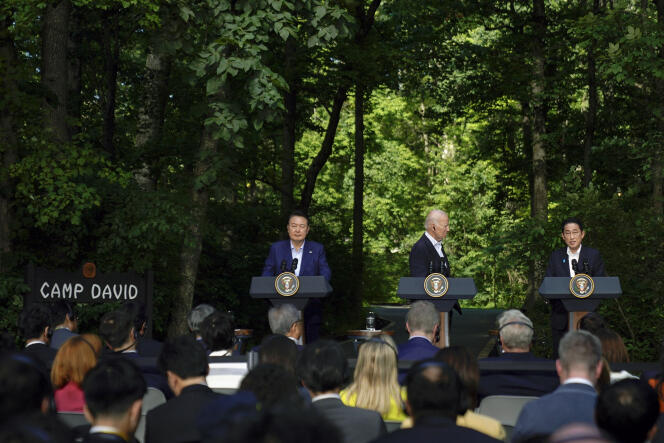


On Friday, August 18, the leaders of the US, Japan, and South Korea met at Camp David, the presidential retreat located in the state of Maryland. There, they declared their commitment to forging closer ties on the security and economic fronts in the face of threats from China and North Korea. Overcoming long-standing differences (and despite some reluctance by Japan and South Korea to wholeheartedly join the US in its antagonism with China), U.S. President Joe Biden, Japanese Prime Minister Fumio Kishida, and South Korean President Yoon Suk-yeol have invoked the "Spirit of Camp David" in pledging "a new era of partnership." The three partners have nonetheless declined to pursue a formal alliance.
The meeting took place against a backdrop of tensions with the Chinese and North Koreans. Japan had scrambled fighter jets on August 18 after two Russian II-38 spy planes were spotted at the edge of the Sea of Japan. A few days earlier, the Russian and Chinese navies, which were then engaged in joint exercises in the Pacific Ocean and the East China Sea, had sent nine ships between the islands of Okinawa and Miyakojima (southwest Japan).
Following clashes with the Philippines over a disputed atoll, China launched operations in the Taiwan Strait on Saturday, in response to a visit to the US by Taiwanese Vice-President William Lai. On their end, North Korea, on August 17, sent fighter jets in response to a U.S. strategic reconnaissance aircraft that had penetrated its airspace. In July, it had fired off a new Hwasong-18 intercontinental ballistic missile.
While emphasizing that this was not a "summit about China," the participants at the Camp David meeting voiced concerns about Beijing's "economic coercion" and "heightened tensions." They also reaffirmed their "shared commitment to maintaining peace and stability in the Taiwan Strait."
In concrete terms, the Camp David meeting should lead to enhanced security cooperation, specifically through a "consultation" commitment in the event of common threats. This represents a first for the three partners, who will also conduct a program of joint military exercises over a period of several years and intensify intelligence sharing.
The economic aspect has not been neglected, as the three leaders have expressed their intent to make it a new pillar of their partnership. For example, they discussed the creation of a warning mechanism for shortages of certain products or raw materials. And they want to extend their cooperation to include technology standards, clean energy, biotechnology, and artificial intelligence.
You have 43.19% of this article left to read. The rest is for subscribers only.
